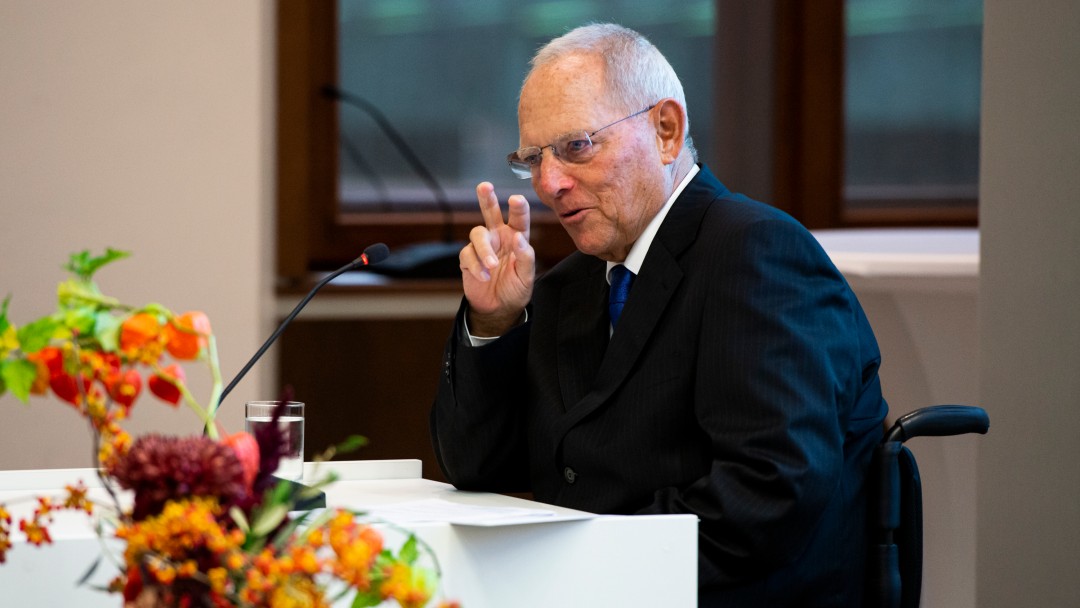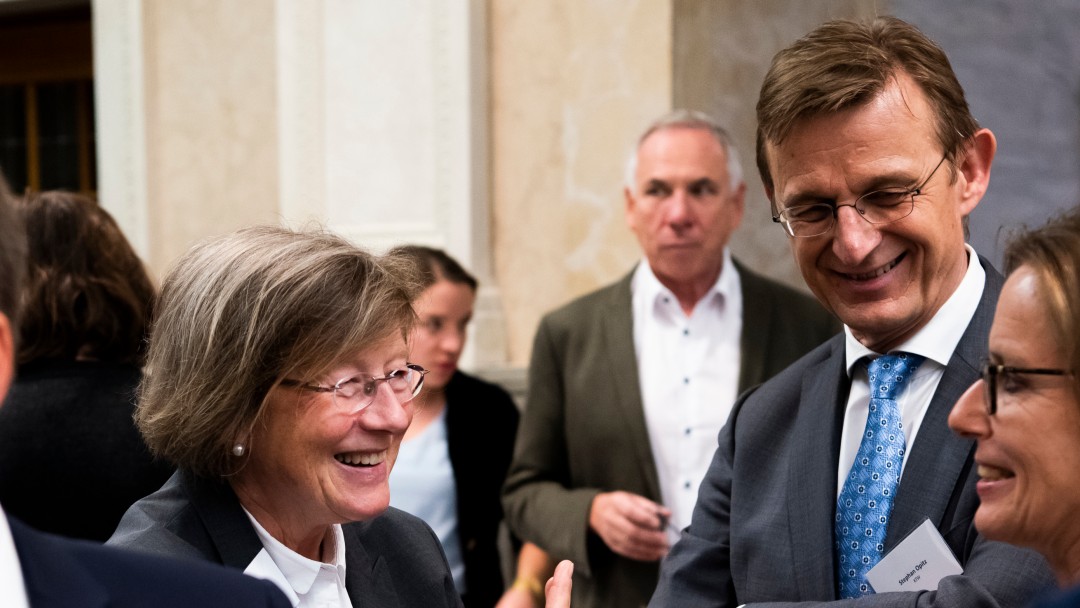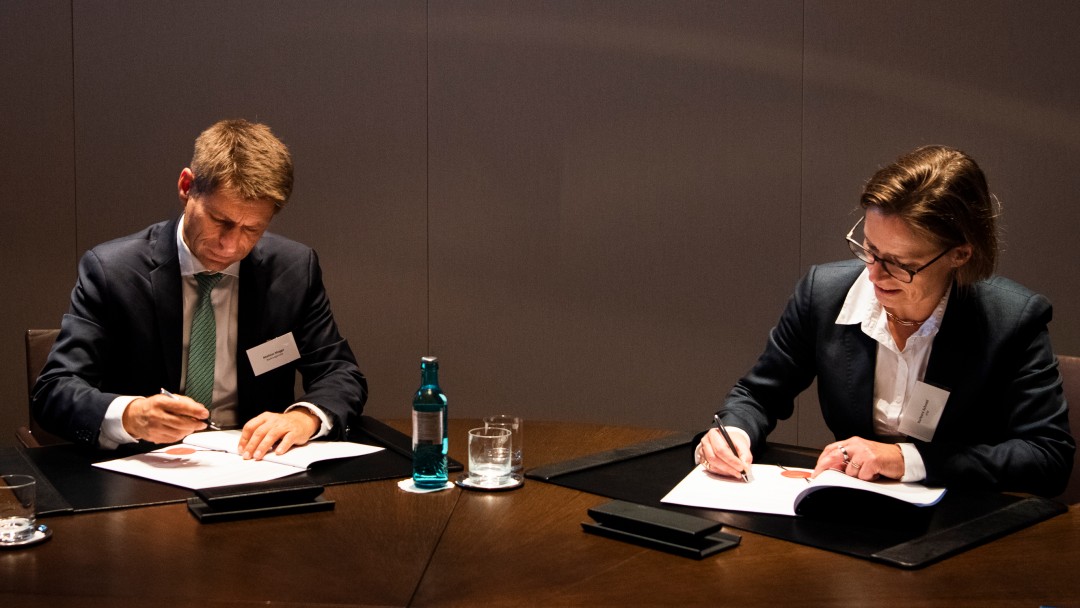News from 2019-10-22 / KfW Development Bank
“Our civilisation is at a turning point”
President of the German Bundestag, Wolfgang Schäuble, at a KfW event about hunger in the age of climate change

How can the fight against hunger and efforts to mitigate climate change be reconciled? This question was the focus of an evening event held by KfW Development Bank and Welthungerhilfe in Berlin on 16 October. The prominent guest speaker was President of the German Bundestag Wolfgang Schäuble, who explored this topic in a twenty-minute-long talk.
Eliminating hunger while mitigating climate change and keeping the oceans intact is an extremely challenging and contradictory task, said Schäuble as he spoke in front of an audience of 150 people. This is because agriculture often competes with climate protection measures like forest conservation or reforestation. Managing both at the same time as set forth in Agenda 2030 “is a major challenge”.
Alarming trend: hunger is on the rise again
The number of people suffering from hunger has recently begun to rise again from less than 800 to 822 million. According to the latest Global Hunger Index results, there are still 47 countries in which hunger is a serious, alarming, or extremely alarming problem. If this development continues, several dozen countries will fail to meet the “zero hunger” target by 2030. So, pressure on food production is increasing.
Nevertheless, Schäuble believes that it would be inappropriate to combat hunger in the short term with measures that are unsustainable over the long term. The President referred to two different groups of people as defined by well-known economist Paul Collier: the “romantics”, who want to radically change peoples' lifestyles to live in perfect harmony with nature, and the “uninformed”, who do not respect the planet's limits at all. Schäuble said that he would not include himself in either of the two groups. Instead, he thinks that the best approach is to find a middle ground so as not to ask too much of people. The intent is to reduce poverty and hunger without overburdening the Earth at the same time.
Technical solutions will not suffice
“Technical innovation alone will not be sufficient to solve the problem”, said Schäuble, addressing anyone who believes that innovation and smart new technologies will be enough. “We also need to change the way we produce and consume” and “champion a historically unprecedented transition within our civilisation.” And we have to do it all with extreme urgency. The German Federal Government's climate package, which includes carbon pricing, is thus an important step in this direction.

KfW Head of Department Stephan Opitz, who kicked off the evening's programme, also urged the audience to think differently and take new approaches when it comes to food security and climate change. In particular, there is still much to be done with regard to adjusting to the results of global warming: using water more efficiently, cultivating varieties and species adjusted to new climatic conditions, reducing food losses, and hedging against climate risks were some of the examples he mentioned as important measures. KfW considers itself a climate bank and already promotes these measures. “But in order to effectively combat hunger in the age of climate change, we primarily need a more systematic and larger-scale approach in addition to individual commitments”, in the form of international cooperations and alliances, for example.
The President of Welthungerhilfe, Marlehn Thieme, lamented industrialised countries' lifestyles and way of doing business because they jeopardise the food situation in other areas of the world. “This is why it is now high time to take responsibility for this.” She called for much more ambitious measures to combat starvation and to mitigate climate change.
Climate change increases stress
The participants of the subsequent podium discussion agreed, not least because “climate change acts as a stress multiplier”, as one participant said. It can fuel conflicts, intensify extreme weather events, exacerbate distress or trigger migration – and all of these factors intensify hunger anew for their part. In this respect, hunger and climate change are closely connected.
So, it is all the more important that we farm as efficiently as possible and in the most environmentally-friendly manner as possible while also doing as much as we can to contribute to climate change mitigation. The speakers saw many opportunities to do this, for instance, by rehabilitating land or sequestering carbon in the ground. But the main point is: “We need to act.” That was also the President of the Bundestag's conclusion when he said: “We cannot afford to remain idle.”
KfW and Welthungerhilfe expand cooperation
Before the event, both hosts – Welthungerhilfe and KfW – formally extended an existing cooperation agreement. In it, both parties pledged to expand their cooperation. This includes local projects but also includes joint events, like the one on the occasion of the Global Hunger Index's annual publication on 16 October, which KfW and Welthungerhilfe already hosted for the seventh time.


Share page
To share the content of this page with your network, click on one of the icons below.
Note on data protection: When you share content, your personal data is transferred to the selected network.
Data protection
Alternatively, you can also copy the short link: https://www.kfw-entwicklungsbank.de/s/enzBWrMC.CF0A
Copy link Link copied